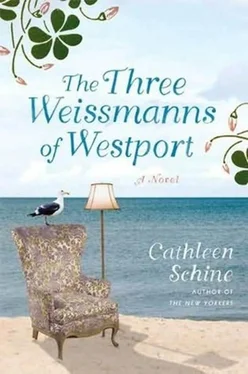Miranda began to sob, not because she knew of the Holocaust as Annie feared, but at the thought of so many ugly people. She had nightmares for a week afterward, but no one blamed Cousin Lou. It was impossible to blame Cousin Lou for anything. And in time the story of Mrs. H. became a welcome ritual for the girls whenever they visited Cousin Lou or he visited them.
Lou would pause on those later occasions. He would narrow his eyes and purse his lips, as if he were thinking, thinking, thinking. "Mrs. Houghteling," he would then say, pronouncing both the H and the gh with a hard, exaggerated Yiddish ch, as if he were clearing a hairball from his throat. It was only years later that Annie and Miranda discovered the proper pronunciation was Hefftling. "Mrs. Chech tling," the girls would chant back at him, feeling the word, an ugly word for an ugly soul, vibrating deliciously in their throats. Then Lou would shrug and say, "Well, I must have been a beautiful baby." And Miranda and Annie would always respond, like good congregants, "'Cause, baby, look at you now."
They had heard the story so many times that "chechtling" had become a Weissmann family verb for snobbish behavior. "Stop chechtling, you big prig," Miranda would say if Annie turned up her nose at some outlandish adolescent style Miranda was affecting. "You're just a selfish bourgeois chechtler," Annie would say when Miranda made fun of her brief eighth-grade Maoist phase.
Cousin Lou, who insisted that everyone call him Cousin Lou, was not a subtle man, but he was a sincere one. He had made a great deal of money as a real estate developer, but his true business seemed to be providing food and drink for as large a number of guests as he could manage. Passionately devoted to his adoptive American family, his definition of that family had grown so prodigiously over the years that he could no longer fit all of his family into his house at one time, or even two. "You're like family!" he would say, embracing freeloaders, friends, hangers-on, acquaintances, in-laws, and stray children from the neighborhood. Like many immigrants, he was a patriot, and the frenetic magnanimity of his social activity was, as he saw it, his patriotic duty.
His first solution to convivial overpopulation had been to build ever bigger houses for himself. He now lived in a sprawling modern house of glass on a steep hill overlooking Long Island Sound. But even this would not accommodate his guest list. The teeming friends who were "like family" multiplied like fruit flies in a jar, and Lou had finally begun to rotate them in shifts, one swarm at a time.
One of Betty's times, an exalted one, was Labor Day. When Lou called this year to invite her and Joe and the girls to his usual Labor Day party in Westport, Betty said, "Oh, what a shame. Joseph would have loved to come, but he's divorcing me. Well, maybe next year," and hung up.
It was this kind of behavior, fey and satirical and so unlike their normally open, cheerful mother, that filled Annie and Miranda with despair and, when they were honest with themselves, outrage not just at Josie but at Betty as well.
"She's insane," Annie said when Lou called to ask what was going on. "He's driven her mad. You can't tell her anything. She won't listen. All she does is watch black-and-white movies all night and quote them all day. She's paralyzed, she's broke, she sits by the phone and waits for him to call. I know she does. She answers on the first ring. Did you notice? And she might have been drunk, too. My mother! Drunk! Was she? God, I hope not. Was she?"
"Well now, let me think-"
"-and I had to force her to get a lawyer-she wasn't even going to get a lawyer! She can't pay the bills. The bastard has somehow cut her off, and he says nothing can go forward until the apartment is empty and…"
But by now Cousin Lou had gotten the picture, and to him it was a picture of a refugee, and he never could resist a refugee. Within minutes he had called Betty and invited her to come and stay in Westport, as long as she liked, in a cottage he owned at Compo Beach.
Betty knew the property was extremely valuable. It stood in a little cluster of little streets among what had once been other little beach cottages. Small, cheek-by-jowl, with tiny front yards, no garages, the cottages had not been fashionable during the heyday of the suburban house and showy green lawn, when she and Joseph and the children had briefly lived in the town. Schoolteachers rented them in those days. A few divorced mothers or widows fallen on hard times. Like me, Betty thought. Somewhere in the late 1980s all this changed and the cottages were snapped up and vigorously renovated. They were now a huddle of self-consciously and charmingly designed "vacation homes"-McCottages, Annie called them. Lou's bungalow was the sole survivor from the old days. He had been renting the place out to the same woman and her son for years-"They're like family!" But now the son had grown up and moved away, and the old lady had finally died.
"Don't you want to beautify it?" Betty asked, using Cousin Lou's code for demolition.
"Time enough for beautification," he assured Betty. "Just your presence will be beautification."
Betty tried to remember Lou's cottage. A little boy had been swinging from a rope swing, she was sure. From an apple tree in bloom. Or was that in a movie she'd seen? Well, never mind. It was a charming place, it had to be; it was a cottage, after all. Cottage. Such a charming word. She imagined rose-patterned wallpaper. She would take long, lonely walks by the sea. It was only Long Island Sound, not the sea, really, but there were sure to be gray, windy days nevertheless. She stared out the window at the nighttime view she'd known for so long. The park was black and deep, the yellow pool of a streetlight puffing out of the darkness here and there, a taxi's red taillights just visible, then gone. Could Joseph really mean for her to abandon her life, just as he had abandoned her? Well, then. What did she have to lose? It was all gone already.
"You're very generous," she said. She shook off an uncomfortable echo of Joseph's voice- I'll be very generous… very generous… "Thank you, Cousin Lou. What would I do without you?"
"Ha!" cried Cousin Lou. "I think we should ask Mrs. James Houghteling that one!" And he chuckled, invoking that long-gone lady's name three more times before hanging up.
And so it was, against the advice of the divorce lawyer Annie insisted her mother hire, and in direct refugee defiance of the spirit of the wife of the former Commissioner of Immigration, that Betty Weissmann decided to emigrate to what Cousin Lou newly dubbed Houghteling Cottage.
Miranda Weissmann was terrifying. This judgment had been passed in an earlier time when, following a briefly fashionable craze for eye exercises, she refused to wear either glasses or contact lenses, consequently sweeping past people she knew without recognizing them. When this seemingly aloof, grand manner was added to a tendency to ask her assistant to retrieve various items that were sitting right in front of her and a habit of inviting editors out to lunch and then not noticing when the bill came and so leaving them with the tab, her reputation was complete. Myopia had established Miranda as irrational, high-handed, sly, and demanding. Myopia made her reputation.
This was at the beginning of her career. A year later, her interests switched first to inversion therapy and then marathon running, at which point she popped in contact lenses and her warmth toward newly visible old friends and acquaintances, so sudden, was that much more pronounced. People were flattered, they were touched. The word around town among young writers was that Miranda Weissmann was unpredictable, but once she turned her attention to you, she would never turn away. The word around town was surprisingly accurate, and the Miranda Weissmann Literary Agency was on its way.
Читать дальше












